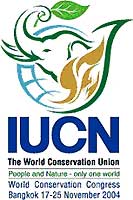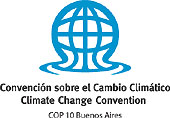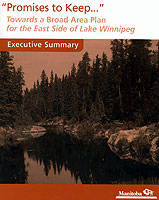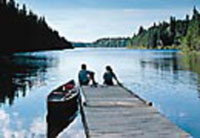
News |
- World Bank Debars Manitoba Hydro Consultant
- No Dam for Magpie River
- 94% of Canadians - Nature is Key to Life
- Support for Boreal World Heritage Site Grows
- COP 10 to Focus on Climate Change
- Boreal Heritage Initiative (BHI) Launched
- World Conservation Congress Urges Boreal Conservation
- ESPI Report Released: No Round Table or Public Review
- Manitoba Wildlands Issues Protected Areas Audit Update
- Supreme Court Confirms Obligation to Consult
- New Protected Areas and Extensions Announced
- CBC Profiles Manitoba Hydropower
World Bank Debars Manitoba Hydro Consultant |
14 December 04 |
 The parent company of Manitoba Hydro's primary engineering consultant has been debarred by the World Bank. Acres International is now ineligible to receive any World Bank financed contracts for three years. The landmark Bank decision last July relates to a corruption scandal involving Africa's largest dam project, a project in which Acres was involved. In 2002 a Lesotho court found Acres guilty of bribing the head of the Lesotho Highlands Water Project. The parent company of Manitoba Hydro's primary engineering consultant has been debarred by the World Bank. Acres International is now ineligible to receive any World Bank financed contracts for three years. The landmark Bank decision last July relates to a corruption scandal involving Africa's largest dam project, a project in which Acres was involved. In 2002 a Lesotho court found Acres guilty of bribing the head of the Lesotho Highlands Water Project.The Lesotho court ordered Acres to pay a criminal fine of about CDN$3 million. Though there was controversy about the delay in paying the fine, Acres spokesperson John Ritchie told Manitoba Wildlands the company made its final payment on September 30 of this year. He says full payment was never a matter of intent, just timing. Acres Manitoba Ltd., wholly owned subsidiary of Acres International has been involved in seven hydroelectric dam projects in northern Manitoba, including its role as primary engineering consultant to Manitoba Hydro for the Wuskwatim Dam project. Acres also assisted with cost estimates and risk analysis for Wuskwatim. Last June Acres International was bought out by Mississauga-based Hatch Limited. View the International Rivers Network release View the World Bank release View the Bretton Woods Project release View the Globe and Mail article |
|
No Dam for Magpie River |
14 December 04 |
 Private hydro developer HydroMega Services Inc. has plans to build a 40 MW dam on the Magpie River, 900 kilometres northeast of Montreal. But there are many people more interested in keeping the scenic river free-flowing Among them is Robert F. Kennedy Jr., President of the Water Keeper Alliance, and Senior Attorney with the National Resources Defense Council. Private hydro developer HydroMega Services Inc. has plans to build a 40 MW dam on the Magpie River, 900 kilometres northeast of Montreal. But there are many people more interested in keeping the scenic river free-flowing Among them is Robert F. Kennedy Jr., President of the Water Keeper Alliance, and Senior Attorney with the National Resources Defense Council."Quebec has a masterpiece in the Magpie River," Kennedy says. "For Quebec to build a dam on this river would be like finding the Mona Lisa in your basement and painting some-thing else over it to sell it for a quick dollar at a yard sale." Kennedy joined representatives of Berkeley-based International Rivers Network, Sierra Club of Canada, Canadian Parks and Wilderness Society, Greenpeace and others for a rafting trip on the Magpie River, August 2004. The proposed dam on the Magpie is part of a 2001 provincial plan that called for 36 dams on 24 Quebec rivers. As a result of opposition like the pressure arising from the trip on the Magpie, all but three of the 36 projects have been scuttled. View the August 2004 International Rivers Network article (PDF) View theAugust 2004 Toronto Star article Visit the Rivers Foundation website Visit the Coalition Eau Secours (French only) website View the August 2004 Canada News Wire release Source: World Rivers Network |
|
94% of Canadians - Nature is Key to Life |
09 December 04 |
 94 percent of Canadians agree that "experiencing nature and wildlife is one of the best experiences [they] can have." This was one of the findings of the first-ever global public opinion poll on humanity's relationship with nature, released at the IUCN World Conservation Congress (WCC) November 19, 2004. 94 percent of Canadians agree that "experiencing nature and wildlife is one of the best experiences [they] can have." This was one of the findings of the first-ever global public opinion poll on humanity's relationship with nature, released at the IUCN World Conservation Congress (WCC) November 19, 2004.The poll, by global opinion researchers from GlobeScan Incorporated, a Canadian company, in association with the Com+ Alliance of Communicators for Sustainable Development, forms part of GlobeScan's 8th annual International Environmental Monitor survey. It was conducted between June and August 2004 with a representative sample of 20,753 adult citizens across 20 countries. Results show that majorities across the 20 countries surveyed by GlobeScan believe that failure to address species loss within 20 years will imperil Earth's ability to sustain life. The world's citizens report having a deep, practical, and even spiritual relationship with nature. But the belief that individuals have the capacity to help reverse species loss varies extensively from country to country, primarily by levels of economic development. 74% of Canadians disagree that "the current threat to species and their habitat is such a big problem that there is very little the individual can do about it." This is well above the global average of 44%. View the GlobeScan November 19, 2004 press release & Results View the 3rd IUCN World Conservation Congress (WCC) web site Source: GlobeScan Incorporated |
|
Support for Boreal World Heritage Site Grows |
07 December 04 |
 The 3rd World Conservation Congress (WCC) and the Government of Manitoba are the most recent additions to the list of supporters of the Atikaki/Woodland Caribou/First Nations Accord World Heritage Site (WHS) nomination. The 3rd World Conservation Congress (WCC) and the Government of Manitoba are the most recent additions to the list of supporters of the Atikaki/Woodland Caribou/First Nations Accord World Heritage Site (WHS) nomination.In late November 2004, the World Conservation Congress, in Bangkok, Thailand, adopted a recommendation to protect and conserve Canada's boreal forest regions. The Canadian government supported the recommendation, and national and international organizations, including the Canadian Boreal Initiative, Poplar River First Nation, CPAWS Wildlands League and the Natural Resources Defense Council built support for the recommendation at the Congress. Local support from local environmental organizations; the Boreal Forest Network, the Manitoba Wilderness Committee, and Manitoba Wildlands, have also supported the First Nation-nominated potential boreal WHS since it was first brought to the public's attention in 2002 by the First Nations. On December 3, 2004, the Manitoba Government formally announced its support for the WHS nomination, in a protected areas announcement that also featured the newly established Manigotagan Provincial Park. Both the Town of Manigotagan and Hollow Water First Nation gave their consent for protection of Manigotagan River corridor. The Manitoba Government announcement was attended by representatives from all four of the Manitoba First Nations signatory to the Protected Areas Accord, who initiated the WHS nomination. Stan Struthers, Minister of Conservation made the announcement and closed with this comment, "the future of the east side of Lake Winnipeg is something this government takes very seriously. Working with our First Nation and community partners we want to ensure the area is protected with minimal impact from economic opportunities, opportunities that must be conducted in a strictly sustainable way." View the December 2, 2004 press release by the Boreal Forest Network, Manitoba Wilderness Committee, Natural Resources Defense Council, and Manitoba Wildlands View the November 25, 2004 Manitoba Wildlands news item on the World Conservation Congress resolution View the Government of Manitoba December 3, 2004 press release View the Manitoba Government Protected Areas Initiative web page for Manigotagan River Provincial Park View Senator Spivak comments, December 7, 2004, Canadian Senate View Pauingassi First Nation Chief Harold Crowe December 3, 2004 Speaking Notes Sources: Manitoba Wildlands, Government of Manitoba |
|
COP 10 to Focus on Climate Change |
07 December 04 |
 The Tenth Session of the Conference of Parties (COP 10) is being held in Buenos Aires, Argentina, December 6 - 17, 2004. The Tenth Session of the Conference of Parties (COP 10) is being held in Buenos Aires, Argentina, December 6 - 17, 2004. COP 10 will mark the 10th anniversary of the entry into force of the Framework Convention on Climate Change, which serves as a central theme for the meeting. In addition to the accomplishments of the past ten years and future challenges, discussions at COP 10 will highlight a range of climate-related issues including, the impacts of climate change and adaptation measures, mitigation policies and their impacts, and technology. Participants will also take stock of the entry into force of the Kyoto Protocol. NGOs such as Climate Justice Now! and the Global Justice Ecology Project will be in attendance to bring attention to such issues as equity and carbon emissions trading initiatives and GE trees in carbon-offset plantations. COP 10 commences amid recent revelations that Canada is not on track to meets its Kyoto commitments, explanations for strange climate change 'mirages' in the arctic, and the possibility of holding countries and individual companies responsible for their economic contributions to climate change. View the Government of Iceland's presentation: Arctic Climate Impact Assessment Visit the 10th Conference of the Parties (COP 10) web site Visit the Climate Justice Now! web site Visit the Global Justice Ecology Project web site View the Climate Ark article on the NRCan admission on Canada's Kyoto targets View the December 2, 2004 Globe & Mail article on climate changes in the arctic View the NewScientist.com article on climate change risks and legal responsibility View the The International Institute For Sustainable Development (IISD) COP-10 Highlights Sources: UN Framework Convention on Climate Change, Climate Justice Now!, Global Justice Ecology Project, Canadian Press, Globe & Mail, NewScientist.com |
|
Boreal Heritage Initiative (BHI) Launched |
02 December 04 |
 Environmental groups launched the Boreal Heritage Initiative (BHI), a new initiative aimed at promoting the protection and conservation of 4.3 million ha of boreal forest in Manitoba including the World Heritage Site (WHS) status. The BHI is a project of the Boreal Forest Network (BFN), in partnership with Manitoba Wildlands and US-based Natural Resources Defense Council (NRDC). Environmental groups launched the Boreal Heritage Initiative (BHI), a new initiative aimed at promoting the protection and conservation of 4.3 million ha of boreal forest in Manitoba including the World Heritage Site (WHS) status. The BHI is a project of the Boreal Forest Network (BFN), in partnership with Manitoba Wildlands and US-based Natural Resources Defense Council (NRDC). The November 30, 2004 launch followed a noon-hour press conference and took place in the Grand Hall at Fort Gibralter in Winnipeg, a historic site of the North West Company, which established the first trading posts in the boreal region. Along with presentations by BFN and members of Bloodvein and Poplar River First Nations, the launch featured an auction of a Robert Bateman original, storytelling by Rick McNair, and a draw for a guided Wilderness Adventure canoe tour down the Bloodvein Canadian Heritage River in the heart of the proposed WHS. BFN's first VIP media tour of the Bloodvein Heritage River, in fall 2004 was the start of a series planned for 2005 and 2006. Senator Mira Spivak was also presented with the first annual Boreal Heritage Initiative Award, for her remarkable contribution to the environment. Senator Spivak co-chaired the Canadian Senate's Boreal Committee during the 1990's. Representatives of all three political parties in Manitoba were in attendance at the launch. First Nations initiated the Atikaki/Woodland Caribou First Nations Accord nomination of this UNSECO-World Heritage Site (WHS) in 2002. The largest portion of the WHS nomination is comprised of the First Nations' traditional territories. The BHI partners aim to ensure that the ecological integrity and geographic scope of the proposed World Heritage Site, in eastern Manitoba and north western Ontario are maintained throughout the process. View the press release for the BHI launch View the November 30, 2004 presentation regarding the BHI (DOC) View the Subcommittee on Boreal Forest of the Standing Senate Committee on Agriculture and Forestry web site View the Canadian Boreal Initiative: The Boreal Forest at Risk: A Progress Report |
|
World Conservation Congress Urges Boreal Conservation |
25 November 04 |
 A recommendation calling on Canada, Russia, and all boreal forest nations to recognize, preserve and protect ecological processes that sustain the overall health of boreal forest regions has been accepted by the 3rd IUCN World Conservation Congress (WCC), being held in Bangkok, Thailand (November 17-25, 2004). A recommendation calling on Canada, Russia, and all boreal forest nations to recognize, preserve and protect ecological processes that sustain the overall health of boreal forest regions has been accepted by the 3rd IUCN World Conservation Congress (WCC), being held in Bangkok, Thailand (November 17-25, 2004).The recommendation makes specific reference to the need to "facilitate and continue to fund needed scientific, technical, indigenous and local community activity to assist in the nomination and designation of boreal forest regions as recognized international sites, for example, World Heritage Sites such as the indigenous led Atikaki/Woodland Caribou/Accord First Nations - Manitoba and Ontario nomination, recently placed on Canada's official Tentative List for World Heritage Sites." Members of Poplar River First Nation have been in attendance at the WCC and participating in the workshops and negotiations to bring the recommendation before the WCC Assembly. Manitoba Wildlands and the Natural Resources Defense Council have been working with the First Nation involved in the World Heritage Site nomination. The recommendation urges Canada, Russia, and all boreal forest nations to ensure the conservation of boreal forest regions by enhancing and expanding protected areas, establishing new protected areas, and enforcing sustainable land use practices. It also calls for future conservation options to be ensured by having community and ecosystem land use planning precede the allocation of forestry, oil and gas development, new highways, mineral development, hydroelectric development licenses or other industry uses. Visit the web site of the 3rd IUCN World Conservation Congress Download a copy of the WCC Recommendation CGR3.REC021 - Conservation of Canada's Boreal Forest Visit the Poplar River First Nation web site Visit the Pikangikum First Nation web site - The Whitefeather Forest Initiative View a map of the Atikaki/Woodland Caribou/Accord First Nations World Heritage Site nomination (PDF) Source: IUCN, IISO, Earth Negotiations Bulletin, NRDC |
|
ESPI Report Released: No Round Table or Public Review |
16 November 04 |
 Manitoba's Minister of Conservation today announced that he was in receipt of a report by the East Side Planning Initiative (ESPI) that is "the culmination of 80 meetings and hundreds of hours of discussions with people representing First Nations, Métis and non-Aboriginal communities within the east side of Lake Winnipeg". Manitoba's Minister of Conservation today announced that he was in receipt of a report by the East Side Planning Initiative (ESPI) that is "the culmination of 80 meetings and hundreds of hours of discussions with people representing First Nations, Métis and non-Aboriginal communities within the east side of Lake Winnipeg".The contents of the ESPI report have not been reviewed by or approved by the members of the ESPI Round Table who were charged with developing the report. Submission of the ESPI report without final review by the Round Table, and without public review is contrary to the principles of the Consultation on Sustainable Development Implementation (COSDI) report, which the Doer government adopted as policy when it came into office in 1999, and which was intended as a framework for the ESPI process. Manitoba Wildlands, the Boreal Forest Network, and the Western Canada Wilderness Committee are urging the Manitoba government and Conservation Minister Stan Struthers to initiate a public review of this report and solicit public comments. Gaile Whelan Enns, Director of Manitoba Wildlands expressed disappointment after a preliminary examination of the ESPI report. "The written comments from Manitoba environmental organizations are not included in this 200-page report. Sadly, we are not surprised because the report (and previous drafts) often contradict this government's policies and commitments. Manitoba Wildlands will hold our government to its protected areas commitments, and protection standards, despite what this report has mistakenly said." View the full Manitoba Environmental ESPI press release Download the East Side Planning Initiative (ESPI) Report Documents View the Manitoba Government November 16, 2004 ESPI press release View the Canadian Boreal Initiative November 25, 2004 Press Release View Manitoba Wildlands news items regarding the ESPI; July 2004, May 2004, Oct 2002 View ESPI information from Manitoba Wildlands View ESPI information from the Boreal Forest Network View ESPI information from the Manitoba Chapter of the Western Canada Wilderness Committee View the Government of Manitoba ESPI web site Sources: Manitoba Wildlands, Government of Manitoba |
|
Manitoba Wildlands Issues Protected Areas Audit Update |
15 November 04 |
 Today, Manitoba Wildlands released an updated version of the protected areas audit for Manitoba, as a follow-up to the annual protected areas grade (released July 7, 2004). The protected areas audit was first issued in May 2003 and was conducted to verify a statement in the November 2002 Speech from the Throne: "Since 1999 close to a million hectares has been added to protected areas and parklands in Manitoba". Today, Manitoba Wildlands released an updated version of the protected areas audit for Manitoba, as a follow-up to the annual protected areas grade (released July 7, 2004). The protected areas audit was first issued in May 2003 and was conducted to verify a statement in the November 2002 Speech from the Throne: "Since 1999 close to a million hectares has been added to protected areas and parklands in Manitoba".This November 2004 update to the protected areas audit reflects the current state of protected lands in Manitoba and includes decisions by government announced June 14, 2004. No new land has been protected since spring 2004, when the Manitoba government made a renewed commitment to protected areas establishment. Expected activities in 2004 and 2005 that would confirm the government's commitment to protected areas establishment include: updating Manitoba's Action Plan for a Network of Protected Areas; completion of the negotiations for the establishment of a new national park in Manitoba's Interlake; and action on the commitment by Manitoba Hydro to support protected areas establishment in the natural regions where hydro development is being planned. The audit shows that the task of establishing protected areas that adequately represent Manitoba's landscapes and protect ecological integrity is far from complete. In fact, only roughly 1/3 of the lands needed to complete Manitoba's Network of Protected Areas are protected at this time. The audit is based on government information in the public domain, primarily in the form of regulations and databases associated with certain Manitoba Acts that specify land use and land protection. In addition, the audit shows that the amount of protected land in Manitoba has actually decreased since September 1999, the year Manitoba's NDP government was elected. View Manitoba Wildlands' November 2004 updated Protected Areas Audit (405KB PDF) View the 2004 Protected Areas Grade View Manitoba Wildlands June 2004 Protected Areas news item Source: Manitoba Wildlands |
|
Supreme Court Confirms Obligation to Consult |
09 December 04 |
 The Supreme Court of Canada issued two related decisions on Aboriginal rights and the crown obligation with respect to consultations, on November 18, 2004. The first case involves logging on Haida Gwaii (Queen Charlotte Islands). The court upheld that the province must consult the Haida and take their concerns into consideration should logging licenses be granted by the government. This ruling applies even though the Aboriginal rights asserted by the Haida have not yet been "proven."
The Supreme Court of Canada issued two related decisions on Aboriginal rights and the crown obligation with respect to consultations, on November 18, 2004. The first case involves logging on Haida Gwaii (Queen Charlotte Islands). The court upheld that the province must consult the Haida and take their concerns into consideration should logging licenses be granted by the government. This ruling applies even though the Aboriginal rights asserted by the Haida have not yet been "proven."In the second decision, the court ruled that the B.C. Government had a legal duty to consult the Taku River Tlingit First Nation with respect to mining-related development, and that the government had fulfilled this duty. Both decisions were unanimous and have implications for all of Canada, including provincial governments, in terms of the relationship between Aboriginal peoples and governments. At a November 19, 2004 address at the 2004 annual Mining and Minerals Convention, Manitoba Premier Gary Doer seemed confident that Manitoba would not have to make any changes to its consultation practices as a result of the Court decisions. "There might be some questions about the Supreme Court decision yesterday in Canada dealing with the obligations to consult with First Nations on Crown land. We have actually been operating all our economic decisions in areas where First Nations are affected consistent with the principle of consultation that was contained in the Supreme Court ruling." View the Supreme Court of Canada decision in the Haida case View the Supreme Court of Canada decision in the Tlingit case View the news release from the law firm of the Haida Nation Download the comments from Tlingit law firm (4.5 MB PDF) View the Union of BC Indian Chiefs news release and background information View the Province of BC press release Sources: Supreme Court of Canada, Haida Nation, Union of BC Indian Chiefs, Province of BC
|
|
New Protected Areas and Extensions Announced |
03 December 04 |
 Conservation Minister Stan Struthers announced the addition of a new Ecological Reserve, the extension of interim protection for Chitek Lake park reserve, and an addition to an existing provincial park, November 29, 2004 The decisions will result in the addition of 22 hectares of protected lands to Manitoba's network of protected areas and continues interim protection for 100,300 hectares of land.
Conservation Minister Stan Struthers announced the addition of a new Ecological Reserve, the extension of interim protection for Chitek Lake park reserve, and an addition to an existing provincial park, November 29, 2004 The decisions will result in the addition of 22 hectares of protected lands to Manitoba's network of protected areas and continues interim protection for 100,300 hectares of land.The 7 hectare Jennifer and Tom Shay Ecological Reserve is Manitoba's eighteenth ecological reserve and features a rare river-bottom forest along the eastern bank of the Red River. Protection of this site, which was flooded in the 1997 Flood of the Century, also honours the lifelong contributions of the Dr. Jennifer and Dr. Tom Shay in protecting Manitoba's ecological systems and heritage. The minister also announced the extension of the 100,300 hectare Chitek Lake Park Reserve to 2009. The extension was requested by the Skownan First Nation to allow for more time for community review of the proposal to establish a permanent park in the area. The Chitek Lake park reserve overlaps with the 2004 proposed boundaries for the Lowlands national park. Finally, Minister Struthers announced the signing of a lease-exchange agreement to add land owned by Marcel Taillieu to Beaudry Provincial Park. The Taillieu property covers 15 hectares of river-bottom forest along the north bank of the Assiniboine River bordering Beaudry Provincial Park. View the Government of Manitoba press release View the Manitoba government Protected Areas Initiative map Download the Ecological Reserves Act regulation (211/2004) of November 30, 2004 (PDF) Download the Provincial Parks Act regulation (182/2004) of September 30, 2004 extending interim protection for Chitek Lake Park Reserve (PDF) Download Dr. Tom Shay's speaking notes Download Minister Struthers' speaking notes Source: Government of Manitoba
|
|
CBC Profiles Manitoba Hydropower |
29 November 04 |
 CBC TV Manitoba is profiling the issue of hydropower development in Manitoba in a new feature report series called The Price of Power. The series covers past and ongoing impacts to First Nation communities resulting from Manitoba Hydro projects, the new relationship that is emerging between Aboriginal communities and the utility, and differing points of view regarding the positive and negative aspects of proposed hydro projects. The Wuskwatim projects are a focus of the feature.
CBC TV Manitoba is profiling the issue of hydropower development in Manitoba in a new feature report series called The Price of Power. The series covers past and ongoing impacts to First Nation communities resulting from Manitoba Hydro projects, the new relationship that is emerging between Aboriginal communities and the utility, and differing points of view regarding the positive and negative aspects of proposed hydro projects. The Wuskwatim projects are a focus of the feature.The CBC feature includes links to Manitoba Hydro, more information on Aboriginal communities and a link to ManitobaWildlands.org. View the CBC.ca feature The Price of Power Source: CBC Manitoba
|
|


 RSS Feeds:
RSS Feeds: